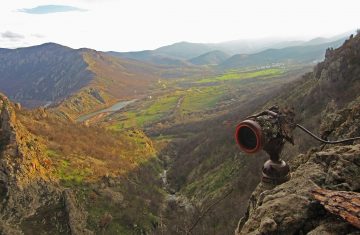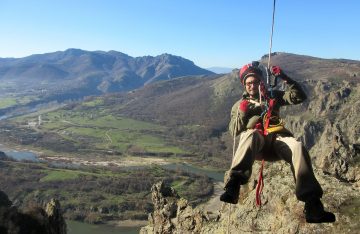The camera will hopefully offer thrilling close-up views of a nesting vulture pair, giving watchers a better understanding of this majestic species and boosting conservation efforts.
A newly installed live webcam in the Rhodope Mountains rewilding area is now providing online viewers a rare glimpse into the lives of Bulgarian griffon vultures. Located in the centre of a major griffon vulture colony, the webcam offers a close-up view of a nest, perched on a cliff high above Studen Kladenets reservoir, together with its feathered visitors.

Last year the camera-equipped nest was occupied by a breeding vulture pair. It is yet to be occupied this year, although there is a small chance that a griffon vulture couple will make a breeding attempt in it before the middle of February, with several birds visiting the nest since the webcam was installed in December. Unlike the Egyptian vulture, which usually breeds in the same nest for several consecutive years, the griffon vulture often changes nesting sites.
“An immature couple landed on the nest just a day after the camera was put in place,” says Volen Arkumarev, a conservation officer with the Bulgarian Society for the Protection of Birds (BSPB). “This is a positive sign that they might breed, but is obviously not a guarantee.”
If the nest does become occupied the webcam will provide valuable new insight into the behaviour of griffon vultures, helping the conservation of this majestic species. It will also strengthen the bond between vultures and nature lovers across the world.
“The daily lives of vultures are fascinating,” says Nelly Naydenova, communications officer of the Rewilding Rhodopes team and LIFE Vultures project. “The webcam’s live feed will bring people closer to these birds. And increased public understanding will boost conservation efforts.”

During courtship griffon vulture couples typically spend most of the day in nuptial flights. In November and December they prepare nests for the upcoming breeding season, and in January-February the female lays one egg. Each parent then takes turn to incubate the egg over the next two months.
Griffon vultures are known to be caring parents, with both partners changing position while hatching the egg and raising their chick. During hot summer days each parent can spend hours with extended wings, shading their offspring. Through the webcam the Rewilding Rhodopes team hope that they can experience such intimate moments over the coming months.
An effective way of non-invasively monitoring wildlife, remote cameras have become an important research tool. The location for this webcam was selected after visiting several potential nesting sites. The device operates entirely on solar energy, and has been carefully camouflaged with natural materials to resemble the surrounding rock.
Installing the webcam in December was no easy task, demanding specialised climbing equipment and skills. Despite windy conditions and low temperatures, however, the project team were ultimately successful.
A video showing the daring installation of the webcam in the Rhodope Mountains rewilding area.The installation of the webcam was carried out as part of the five-year LIFE Vultures project, which was developed by Rewilding Europe, in collaboration with the Rewilding Rhodopes Foundation, BSPB/BirdLife Bulgaria, WWF Greece and the Greek Ornithological Society. Starting in 2016 and focusing on the Rhodope Mountains rewilding area in Bulgaria, as well as a section of the Rhodope Mountains in northern Greece, the aim of the project is to support the recovery and further expansion of the endangered black and griffon vulture populations in this part of the Balkans, mainly by improving natural prey availability, and by reducing mortality through factors such as poaching, poisoning and collisons with power lines.
